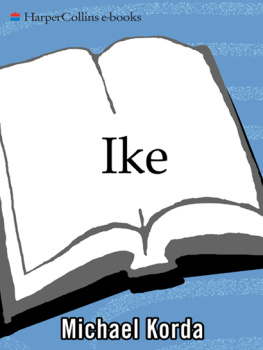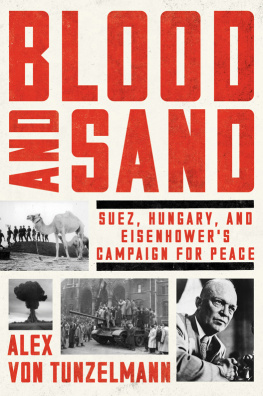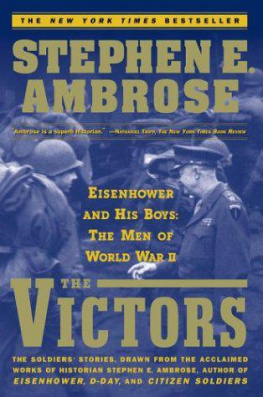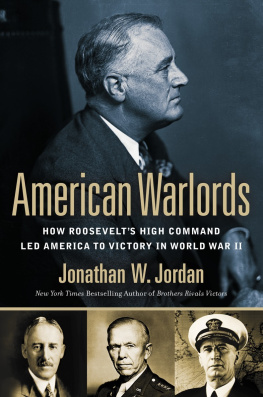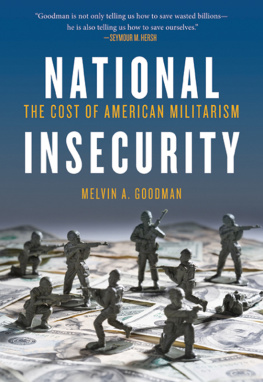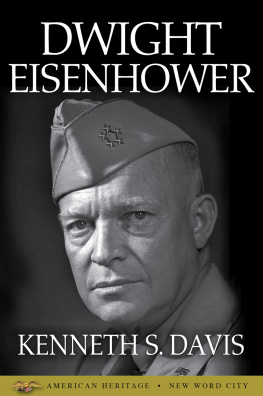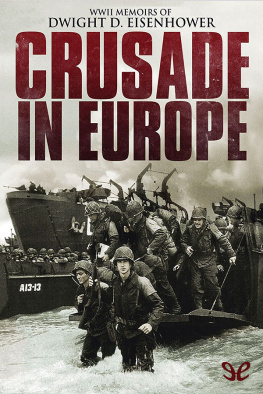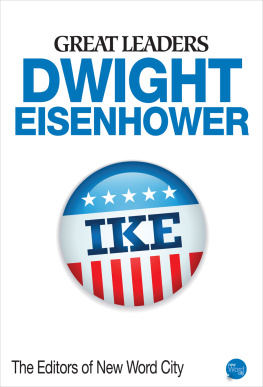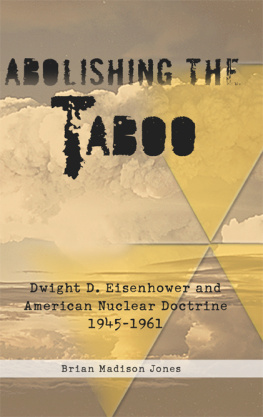Eisenhower Dwight David - Ike
Here you can read online Eisenhower Dwight David - Ike full text of the book (entire story) in english for free. Download pdf and epub, get meaning, cover and reviews about this ebook. City: Place of publication not identified;United States, year: 2009, publisher: HarperCollins, genre: History. Description of the work, (preface) as well as reviews are available. Best literature library LitArk.com created for fans of good reading and offers a wide selection of genres:
Romance novel
Science fiction
Adventure
Detective
Science
History
Home and family
Prose
Art
Politics
Computer
Non-fiction
Religion
Business
Children
Humor
Choose a favorite category and find really read worthwhile books. Enjoy immersion in the world of imagination, feel the emotions of the characters or learn something new for yourself, make an fascinating discovery.
- Book:Ike
- Author:
- Publisher:HarperCollins
- Genre:
- Year:2009
- City:Place of publication not identified;United States
- Rating:5 / 5
- Favourites:Add to favourites
- Your mark:
- 100
- 1
- 2
- 3
- 4
- 5
Ike: summary, description and annotation
We offer to read an annotation, description, summary or preface (depends on what the author of the book "Ike" wrote himself). If you haven't found the necessary information about the book — write in the comments, we will try to find it.
Eisenhower Dwight David: author's other books
Who wrote Ike? Find out the surname, the name of the author of the book and a list of all author's works by series.
Ike — read online for free the complete book (whole text) full work
Below is the text of the book, divided by pages. System saving the place of the last page read, allows you to conveniently read the book "Ike" online for free, without having to search again every time where you left off. Put a bookmark, and you can go to the page where you finished reading at any time.
Font size:
Interval:
Bookmark:
An American Hero

For Margaret, with all my love
And for Lynn Nesbit,
for more reasons that I can list
War is an option of difficulties.
M AJOR -G ENERAL J AMES W OLFE
17271759
There never was a good war, or a bad peace.
B ENJAMIN F RANKLIN
The past is a foreign country; they do things differently there.
L. P. H ARTLEY
If you can talk with crowds and keep your virtue, Or walk with Kingsnor lose the common touchYours is the Earth and everything thats in it, Andwhich is moreyoull be a Man, my son!
R UDYARD K IPLING
In war men are nothing; one man is everything. Only the commander understands the importance of certain things, and he alone conquers and surmounts all difficulties. An army is nothing without the head.
N APOLEON
Maps used by the kind permission of Doubleday, a division of Random House, Inc. Maps are by Rafael Palacios, from Crusade in Europe, by Dwight David Eisenhower, copyright 1948 by Doubleday, a division of Random House, Inc.
I t is not easy to get military ranks correct in dealing with several nations over a long period of time. To avoid confusion, therefore, I have attempted throughout to give the people mentioned in the book their correct rank at the time about which I am writing.
In the case of British figures, I have also tried to deal with the inevitable changes in name that were caused along the way by such honors as knighthoods and peerages. Thus Lieutenant-General Bernard L. Montgomery becomes General Sir Bernard Montgomery and eventually Field Marshal the Viscount Montgomery, and so on.
Where British military ranks are concerned I have included the hyphen with which some of the Army and Royal Navy ranks are correctly written, as in major-general, or regimental sergeant-major. Field marshal and admiral of the fleet are exceptions to the rule, and correctly written without a hyphen. Also, the Royal Air Force does not use hyphens, except in air vice-marshal. I have not used a hyphen in U.S. military titles, since they are correctly written without one.
Regarding German ranks, I have used the German mostly when no clear-cut equivalent exists in English (as in S.S. ranks like SS Standartenfhrer), but sometimes also when the German simply makes more sense and prevents confusing a German general with a British or an American one. As a rule, I have aimed for clarity rather than consistency.
I use Nazi only when referring to people or institutions that were part of the NSDAP, or Nazi Party. I have avoided the use of Nazi instead of German, as in Nazi planes or Nazi tanks or Nazi army. Our enemy in World War II, as in World War I, was Germany, and the Germans. Some of the Germans were Nazis; most of them were not.
With military organizations and units I have tried to make matters as clear as I can. Most armies are roughly similar, in the sense of being divided, in ascending order of size, into companies, battalions, regiments, brigades, divisions, corps, armies, and army groups. Where there are significant differences I will point them out. In the interest of simplicity, I have not followed the military pattern of designating corps with Roman numerals, etc. Instead, numbers through ninety-nine are spelled; 100 and above are in Arabic numerals.
Michael Korda
O urs is neither a nation nor a culture much given to extended hero worship.
Ralph Waldo Emerson understood his countrymen only too well when he wrote, Every hero becomes a bore at last. After all, within his own lifetime Emerson would see both Andrew Jackson and Ulysses S. Grant cut down to size. There is no place in American life for the enduring national cult of a hero, no equivalent of Frances national passion for Napoleon (a cult strangely enough by no means limited to the French), Englands sentimental hero worship of Nelson (and, increasingly, of Winston Churchill), Russias glorification of Peter the Great.
Perhaps it is the price of being a democracy, and of a deep, inherent distrust of the very idea of an elitewe are all egalitarians at heart, or at least feel a need to pay homage to the idea of equality. We have a natural tendency to nibble away at the great figures of the past; to dig through their lives for flaws, mistakes, and weaknesses; to judge them severely by the standards and beliefs of the present, rather than those that prevailed when they were alive. Thus Washington has been marginalized as a dead white male, and as a slave owner, and remembered more for his ill-fitting false teeth than his generalship. Thus Jefferson has been downgraded from his lofty position as the author of the Declaration of Independence to being treated not merely as a slave owner, but as a spendthrift and hypocrite who slept with his own female slaves. Thus Grants tomb stood for many decades forlorn and almost unvisited on Riverside Drive and 122nd Street in New York City, despite the fact that it was, until the end of the nineteenth century, a bigger tourist attraction than the Statue of Liberty.
It is a simple fact of American life, this urge to splash graffiti on the pantheon of our heroes. In other countriesor culturesthe building up of national heroes is a full-time job, respected and well rewarded, in France with membership in the Acadmie Franaise and the Lgion dHonneur, in the United Kingdom with knighthoods and a cozy place in the cultural establishment; but in ours, whole profitable segments of the media and publishing industries prosper by tearing them down. Sic transit gloria mundi might as well be our national motto.
In his own lifetime, for example, Dwight D. Eisenhower underwent a rapid transition from world-class, five-star hero to being ridiculed as an old fuddy-duddy in the White House, out of touch with what was happening in the country, more interested in his golf score than in politics, deaf to the pleas of civil rights leaders (or at least hard of hearing), and, toward the end of his eight years as president, overshadowed by the youth and glamour of the young John F. Kennedy.
It was not just journalists, or editorial cartoonists like Herblock in the Washington Post , or intellectuals of the New Frontier, who made fun of Ikeeven historians of World War II began to turn their heavy guns on him, particularly admirers of General George S. Patton. Pattons advocates formed a stubborn and robust revisionist cult that would reach its peak when Patton became the hero of Richard Nixons favorite movie; they held Ike to blame for failing to turn his fractious subordinate loose to seize Berlin before the Russians did, and by that mistake ensuring a divided Germany and the cold wareven though Patton was too far south to have done this.
Like those revisionists who insist that Blcher, instead of Wellington, won the Battle of Waterloo by arriving on the battlefield with his Prussians at the end of the day, or those who believe that Lee would have won the Battle of Gettysburg if only he had listened to Longstreets advice, Pattons admirerssixty years after the factare still smarting over their heros complaints. As to the validity of their views, one cannot do better than to quote the duke of Wellington himself, who, when a stranger came up to him on Piccadilly and said, Mr. Jones, I presume? is said to have replied, If you presume that, sir, youd presume any damned thing.
The guns had hardly fallen silent in Europe before Eisenhowers rivals and subordinates sat down to write their memoirs or edit their diaries for publication. Most of them were sharply critical of Eisenhower. On the British side of the Grand Alliance the newly ennobled field marshals Lord Alanbrooke and Viscount Montgomery, and General Lord Ismay, if they agreed on nothing else, were united in their view that Eisenhower was no strategist. Indeed General Sir Alan Brooke, as he was then, the acerbic Chief of the Imperial General Staff (CIGS), would remark acidly in his dairy in 1943 on the subject of his plan for the invasion, Eisenhower has got absolutely no strategical outlook.
Font size:
Interval:
Bookmark:
Similar books «Ike»
Look at similar books to Ike. We have selected literature similar in name and meaning in the hope of providing readers with more options to find new, interesting, not yet read works.
Discussion, reviews of the book Ike and just readers' own opinions. Leave your comments, write what you think about the work, its meaning or the main characters. Specify what exactly you liked and what you didn't like, and why you think so.

